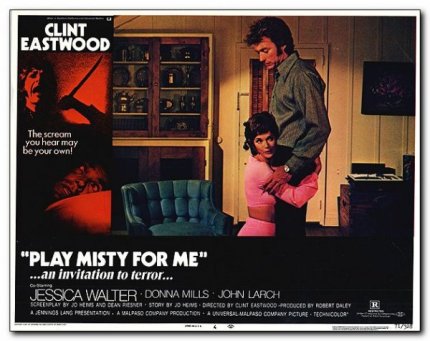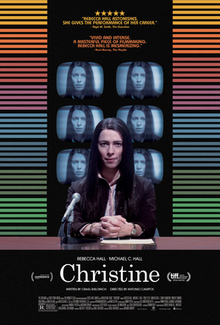
You ever find yourself being completely smothered by somebody? Popular late night radio show host Dave Garver (Clint Eastwood) at jazz station KRML becomes restless in his relationship with artist girlfriend Tobie Williams (Donna Mills). Impulsively, he goes out and has a one night stand with Evelyn Draper (Jessica Walter) a woman he meets at a nightclub. Afterwards he finds out she was not an anonymous hookup, but an obsessive fan who has been calling in repeatedly to request he play the Errol Garner song Misty. Garver soon discovers extricating himself from Evelyn will be no easy feat as she insinuates herself into his life, showing up everywhere and becoming increasingly deranged. He seeks help from policeman Sgt McCallum (John Larch) only realising at the eleventh hour that Tobie may be in danger... Do you know your nostrils flare out into little wings when you’re mad? It’s kinda cute. Eastwood made his directing debut with trusted mentor Don Siegel by his side and playing Murphy the bartender at a local joint in the town where he lived, Carmel-by-the-Sea in Northern California, a locale made look even more beautiful by the skilled cinematography of usual Eastwood DoP Bruce Surtees. The screenplay was written by Jo Heims, a former model and dancer, while Dean Riesner (from Dirty Harry and Coogan’s Bluff) polished it; with the idea for a girlfriend, Tobie, coming from editor Sonia Chernus. It’s a clever and lean premise, brilliantly executed in the economic style we have come to know as Eastwood’s particular stamp. He uses his local knowledge to establish a keen sense of place, with a variety of shots giving us a good idea of the geography of this stunning town, the gorgeous sunlight steadily accreting to create a form of terror all over Monterey County. The tension is marvellously sustained with expert use of the jazz soundtrack (and the local music festival) creating more suspense with Roberta Flack’s The First Time Ever I Saw Your Face used for a romantic mood. (The song’s exposure turned it into a Number One hit.) Walter was Eastwood’s first choice for Evelyn following her appearance in The Group a half dozen years earlier, and we believe her to be so much of a threat that she can do absolutely anything to impose her will; while Mills acquits herself very well as the only stable character in this unwitting love triangle. She had played opposite Burt Reynolds in an episode of his show Dan August and he recommended her to Eastwood. He looked at rushes and hired her without even meeting her. Eastwood is excellent here, completely believable as a man of a certain age who is selfish and unaware and still thinks he can hit it big in the city yet has to bide his time reading poetry late at night to a devoted small town audience. A great first film. I did it because I LOVE YOU!





